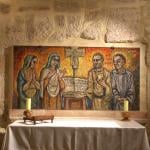Surprisingly, Jesus begins His litany of woe (Matthew 23) by commending the teaching of Jewish scribes and Pharisees. They sit in the seat of Moses, and Jesus’ disciples are to “do and observe” what they say. They may sit in Moses’ seat, but they are not Mosaic in their conduct. Moses came to break the yoke of oppression and free slaves, but the scribes and Pharisees “tie up heavy loads and lay them on men’s shoulders” and refuse to lift... Read more















